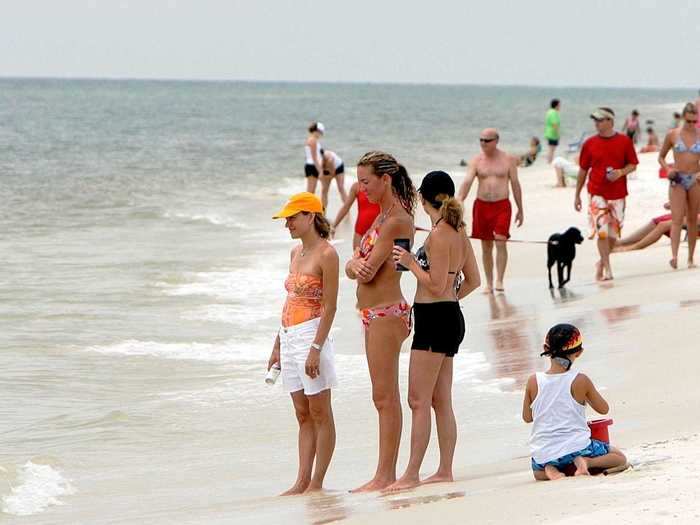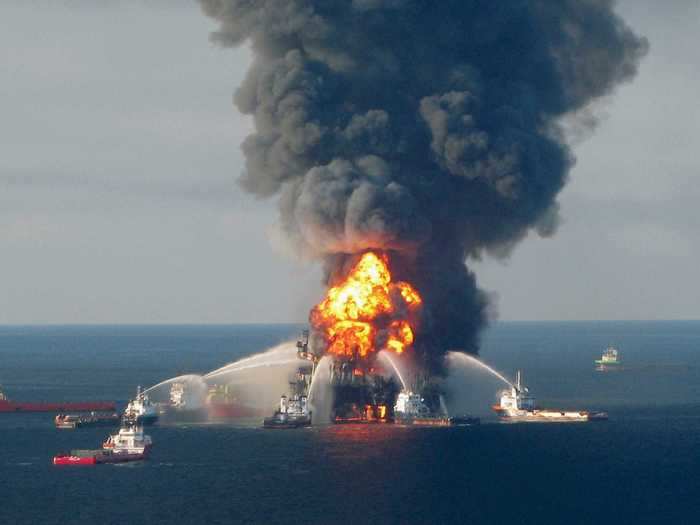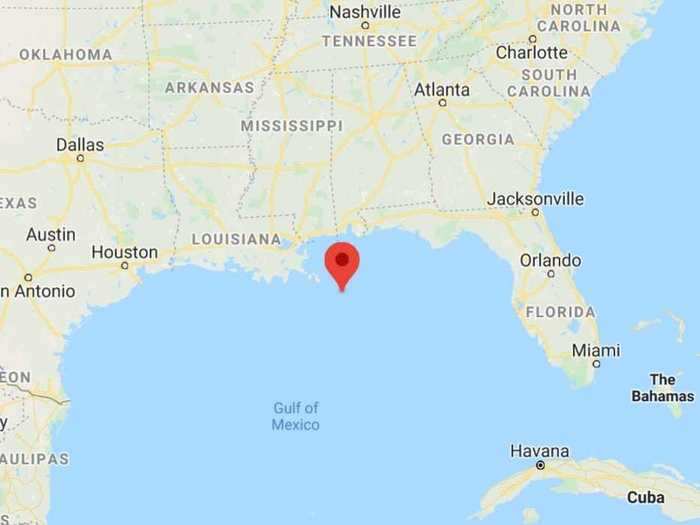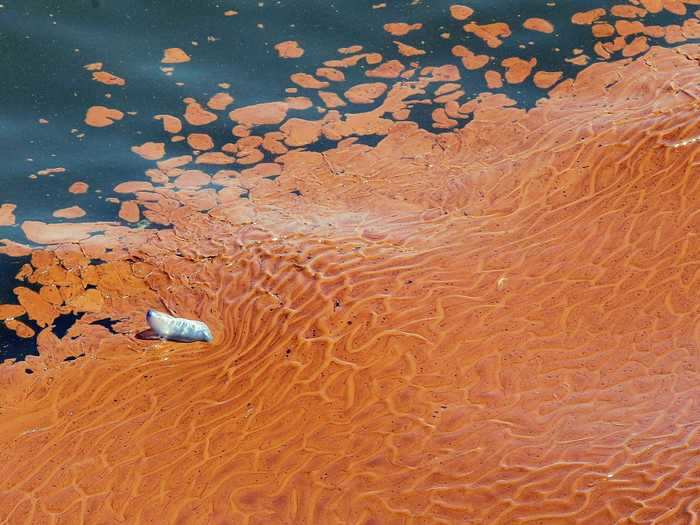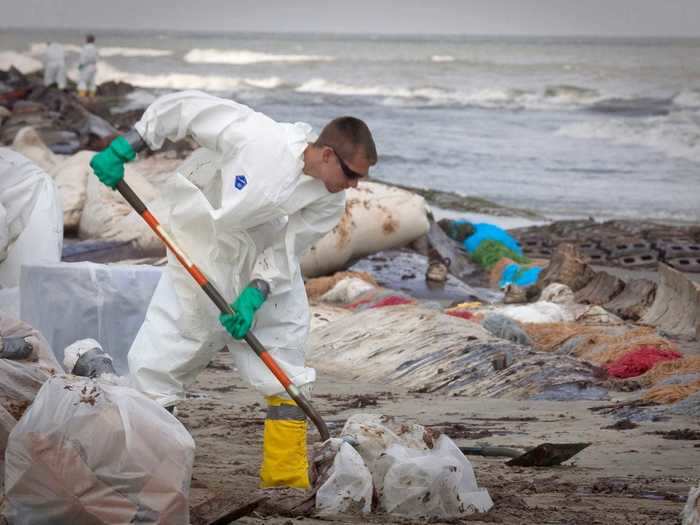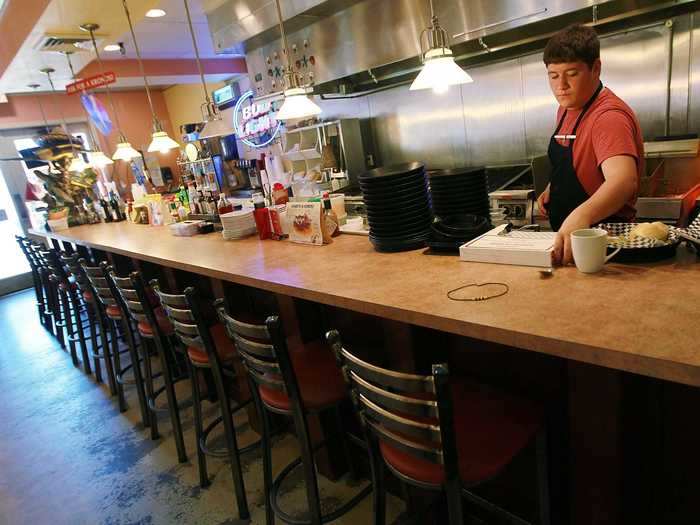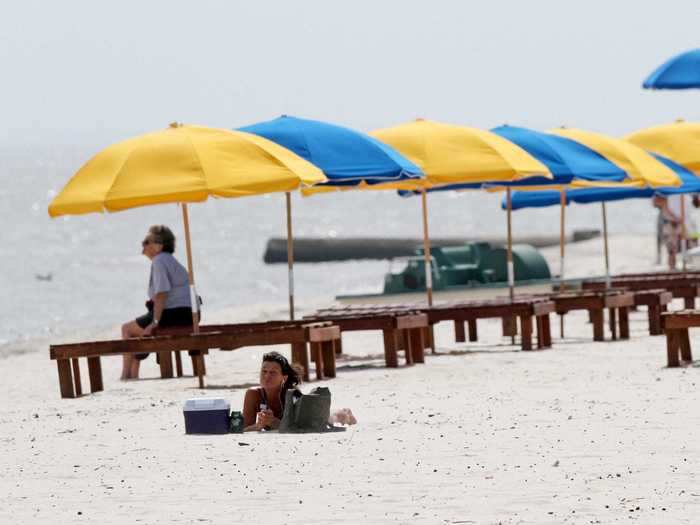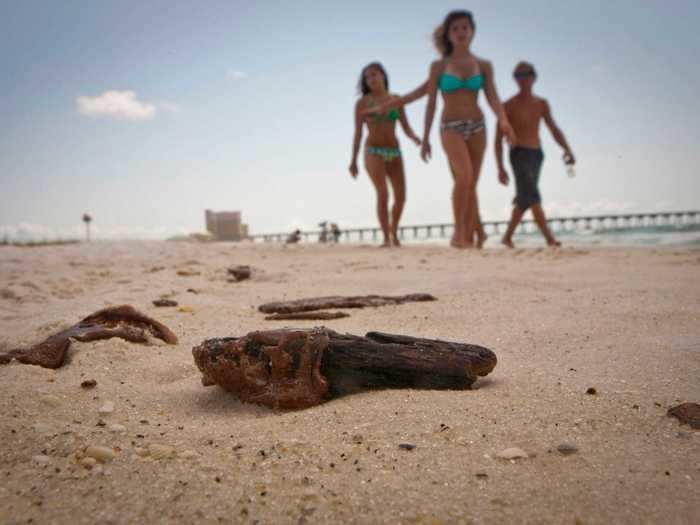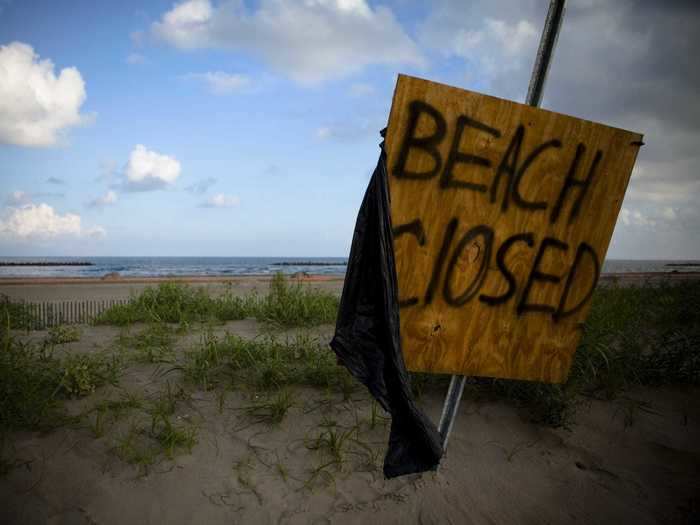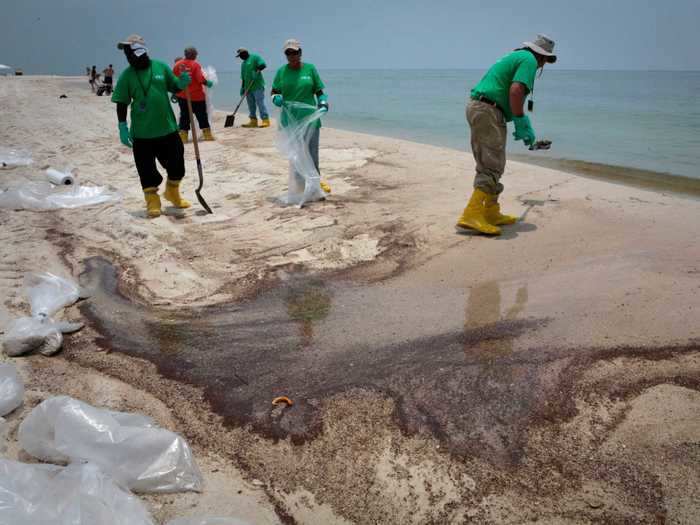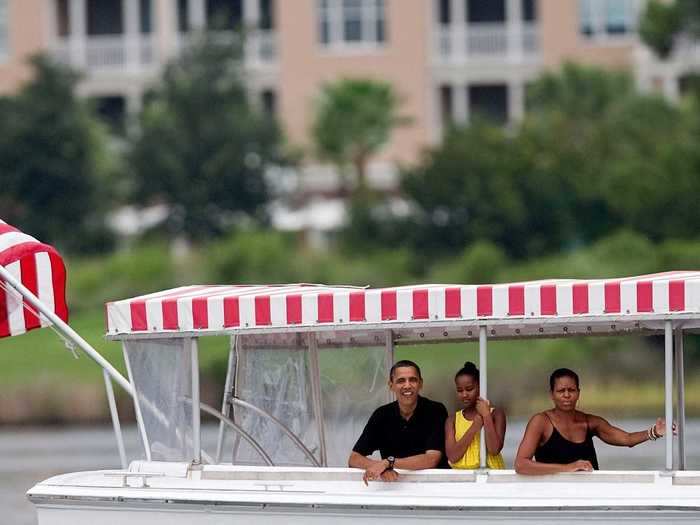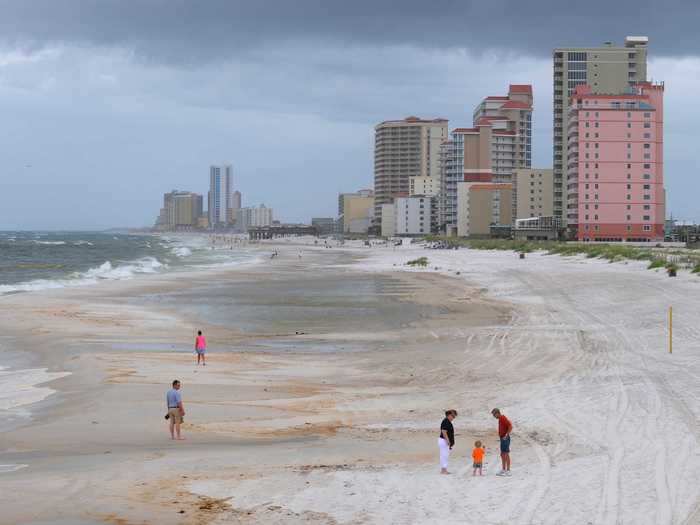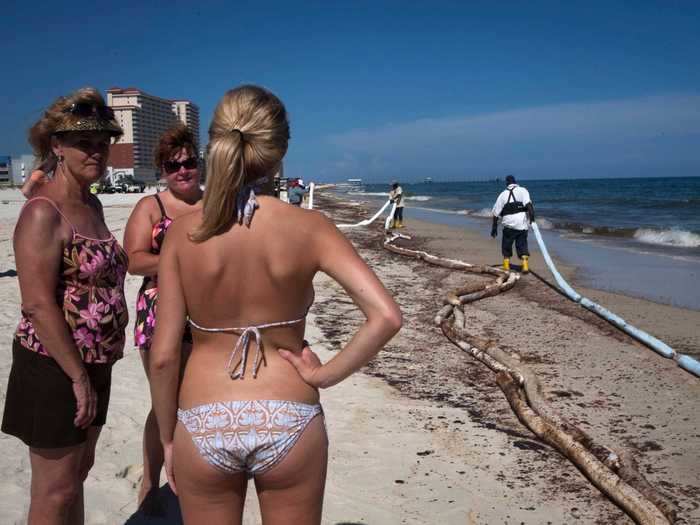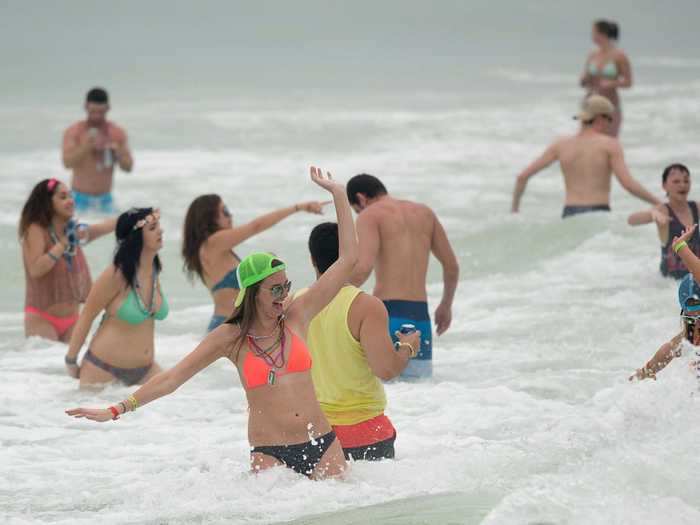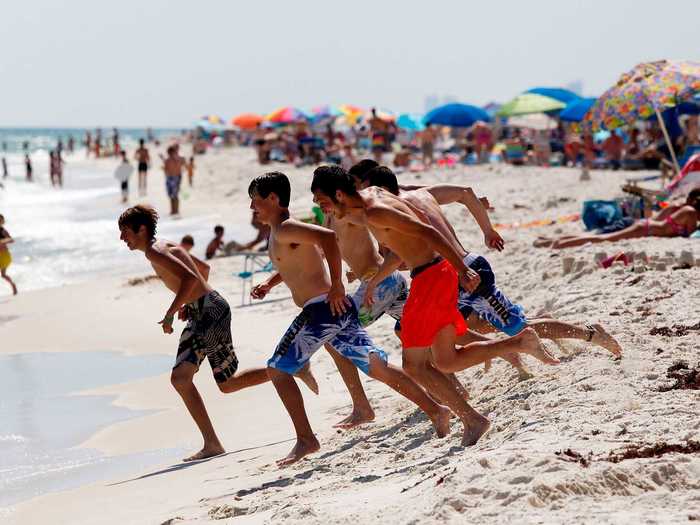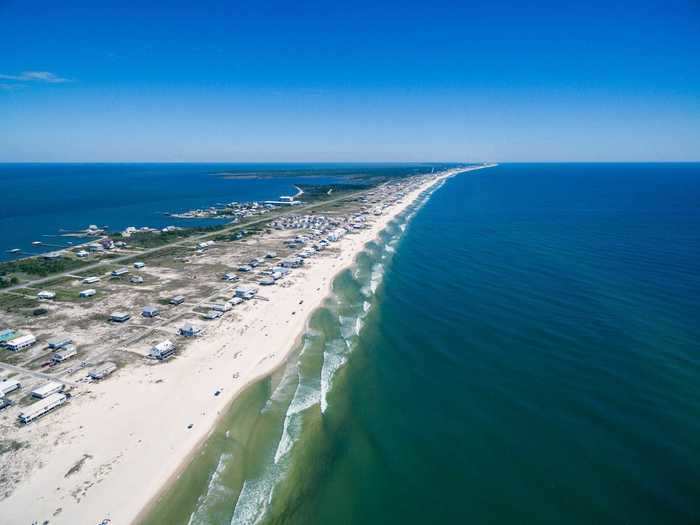Beachgoers look on as a crew cleaning oil from the Deepwater Horizon spill walk by on a beach in Gulf Shores, Alabama June 25, 2010.REUTERS/Lee Celano
- Tourism along the Gulf of Mexico came to a screeching halt in 2010 after the Deepwater Horizon oil spill covered Texas, Lousiana, Alabama, and Florida resort towns' once-pristine beaches with tar.
- Tourism eventually recovered and exceeded its pre-spill levels, thanks in part to BP's aggressive cleanup program and national advertising scheme.
- Almost exactly a decade later, the area's hotels and condos face another existential threat — from the coronavirus crisis and they are already showing signs of recovery even as the number of cases continues to skyrocket.
In April 2010, an explosion at BP's Deepwater Horizon oil rig pumped crude oil into the Gulf of Mexico for five months, covering Lousiana, Mississippi, Alabama, and Florida beaches with tar, and effectively canceling tourism for much of the summer.
In June, July, and August, the Gulf coast's beach towns typically bring in 60% of their revenue, per The Pensacola News Journal. But between June and September 2010, the 90 mile stretch of oceanfront metro areas between Pensacola and Panama City, Florida lost $150 million in tourism each month.
The region's tourism industry was able to quickly recover thanks in part to an aggressive advertising campaign by BP that lured new visitors from across the country.
A decade later, the Gulf's hotel operators, restaurant owners, and tour companies are fighting to stay in business through yet another unprecedented summer slowdown, as the coronavirus crisis has largely halted travel. Hotel bookings have slowed so much in Alabama alone that the state could lose $105.2 million in state and local hotel tax revenue, per AL.com.
Here's how the Gulf region's tourism industry recovered from the Deepwater Horizon disaster.
Florida, Alabama, Lousiana, and Texas all have thriving resort towns along the Gulf of Mexico. The beaches became popular road trip destinations in the 1980s because of their bright white sand and wide array of attractions.
Vacationers on Cape San Blas beach in the Florida panhandle in 2005. Five years later, the area's tourism industry was devastated by the Deepwater Horizon oil spill.
REUTERS/Mark Wallheiser MW/MK
On April 20, 2010, BP's Deepwater Horizon offshore rig exploded, killing 11 and injuring 16. The rig pumped 3.3 million barrels of crude oil into the Gulf of Mexico over the next five months.
Fire boat response crews battle the blazing remnants of the offshore oil rig Deepwater Horizon, off Louisiana.
REUTERS/U.S. Coast Guard/Files/Handout
The rig was located about 41 miles off the coast of Lousiana and spewed crude oil over 57,500 square miles of The Gulf, including approximately 1,100 miles of Lousiana, Mississippi, Alabama, and Florida shoreline.
The location of the BP's Macondo well, which exploded in 2010.
Google Maps
President Obama called the spill "the worst environmental disaster America has ever faced," in a speech from the Rose Garden in June, and pledged to hold BP accountable for the damage to the environment and the local fishing and tourism industries.
A dead Portuguese Man-O-War floats on a blob of oil in the waters of Chandeleur Sound off of Louisiana, Tuesday, May 4, 2010.
Eric Gay/AP
In the worst-hit areas, once snow-white beaches were covered with globs of tar and reeked of oil. The economic fallout spread far beyond the 1,100 miles that were damaged.
A worker contracted by British Petroleum scrapes oil from a beach after it was inundated by the oil spill from the Deepwater Horizon spill in Port Fourchon, Louisiana May 23, 2010.
REUTERS/Lee Celano/Files
News of the spill and viral images of dead sea animals scared away visitors. Even beaches that were still in relatively good shape saw their tourism revenue decline.
Kaan Ciftci waits for customers to arrive at The Boardwalk Cafe in June 2010 in Pensacola, Florida. The cafe experienced a slowdown in business which may be blamed on the residue washing up on Pensacola Beach from the Deepwater Horizon oil spill.
Joe Raedle/Getty Images
Once-packed beaches like the one pictured below in Biloxi, Mississippi, were empty for much of the summer of 2010.
Teresa Briggs, foreground, relaxes on the beach in Biloxi, Mississippi, on Tuesday, May 11, 2010.
John Fitzhugh/Biloxi Sun-Herald/Tribune News Service
Hospitality and foodservice business leaders blamed press coverage of the spill featuring images like this one, of children walking on a beach dotted with tar, for keeping families away.
Beachgoers walk past patches of oil from the Deepwater Horizon oil spill in Pensacola Beach, Florida June 4, 2010.
REUTERS/Lee Celano
Others, like this one in Grand Isle, Louisiana, were closed for months as oil washed up on the beach.
A makeshift sign warns of a closed beach due approaching oil slicks in an affected by the Deepwater Horizon disaster and the British Petroleum oil spill off the Gulf Coast on June 11, 2010 in Grand Isle, Louisiana, USA.
Jeff Hutchens/Getty Images
During the closures, thousands of workers hired by BP embarked on a massive cleanup effort to help restore the beaches to their previous condition. Scientists estimate that about 20% of the spilled oil is still on the ocean floor.
Contract workers shovel oil from a beach impacted by the Deepwater Horizon oil spill in Gulf Shores, Alabama June 16, 2010.
REUTERS/Lee Celano
By August, much of the affected coastline was ready to reopen. Then-President Obama and his family spent a weekend Panama City Beach, Florida, to show people the area was safe to visit.
U.S. President Barack Obama, first lady Michelle Obama and daughter Sasha tour St Andrews Bay on the Bay Point Lady August 15, 2010 In Panama City Beach, Florida. The First Family is visiting the area to help promote tourism and check up on cleanup efforts from the aftermath of the Deepwater Horizon Oil spill.
Mark Wallheiser/Getty Images
The spill caused $693.2 million in losses to the affected area's recreational economies over the next two years, according to National Oceanic and Atmospheric Administration estimates.
Only a few tourists and locals visit the beaches of Gulf Shores, Alabama on Tuesday, June 29, 2010.
Steve Johnson/Miami Herald/Tribune News Service via Getty Images
Nearly a third of people who had planned trips to visit Lousiana alone postponed or canceled their trips after the spill, per the Lousiana Office of Tourism.
Workers use booms to clean oil from the Deepwater Horizon spill as beachgoers look on in Gulf Shores, Alabama in June 2010.
REUTERS/Lee Celano
Some economists credit the $230 million BP spent on grants for business owners and three years of aggressive advertising encouraging Americans to visit the Gulf region immediately following the spill for the area's travel boom over the last decade.
People enjoy the water during spring break festivities in Panama City Beach, Florida March 12, 2015.
REUTERS/Michael Spooneybarger
It was a small portion of the $89.5 billion BP paid to Florida, Alabama, Mississippi, and Louisiana to help jumpstart tourism after the spill.
The campaign lasted for years and was comprised of full-page newspaper ads and nationally run commercials showing BP executives walking along pristine beaches, happy fisherman, and even celebrity chefs Emeril Lagasse and John Besh cooking local seafood.
Emeril Lagasse cooks aboard Carnival Cruise Line's Mardi Gras Ship in 2019.
John Lamparski/Getty Images
A decade after the spill, tourism along the Gulf was at an all-time high before the coronavirus pandemic. The year before the spill, tourism spending was $1.3 billion in Alabama's Gulf Coast region, The Houston Chronicle reported. By 2018, it had quadrupled to $6.2 billion.
Children run into the Gulf of Mexico on Perdido Key, Florida in May 2012, two years after the Deepwater Horizon disaster.
REUTERS/Sean Gardner
One Alabama condominium developer told The Washington Post in 2015 that his business was up 30% from before the spill. "I've traveled as recently as the spring to California, and there were people there who were saying, 'Hey, I saw those commercials about Alabama,' " Bill Brett told The Post.
Gulf Shores, Alabama. Brett's developments not pictured.
Nicholas Courtney/Shutterstock
While hotels and resorts were able to recover, many small businesses that relied on tourists like restaurants, gift shops, and the charter boat and watercraft rental companies didn't. For them, one summer with no visitors was too much.
People look at the entrance to Moby Dicks gift shop during spring break festivities in Panama City Beach, Florida March 12, 2015. Moby Dicks operated throughout the Deepwater Horizon crisis.
REUTERS/Michael Spooneybarger
The Gulf's beach towns are now facing another threat — the coronavirus crisis. After being closed for months, many tourism business have reopened and been overwhelmed by "pent-up demand" despite spiking infection rates throughout the south.
Now Gulf residents are using their 2010 recovery as a playbook for how to jumpstart their economy once again. "At this stage of the game there is not a lot of difference in the two disasters, because there is so much unknown about the virus," Gulf Shores & Orange Beach Tourism's Herb Malone told The Chronicle.
Beachgoers enjoy a day of sunshine at Galveston Beach on May 2, 2020 in Galveston, Texas.
MARK FELIX/AFP /AFP via Getty Images

